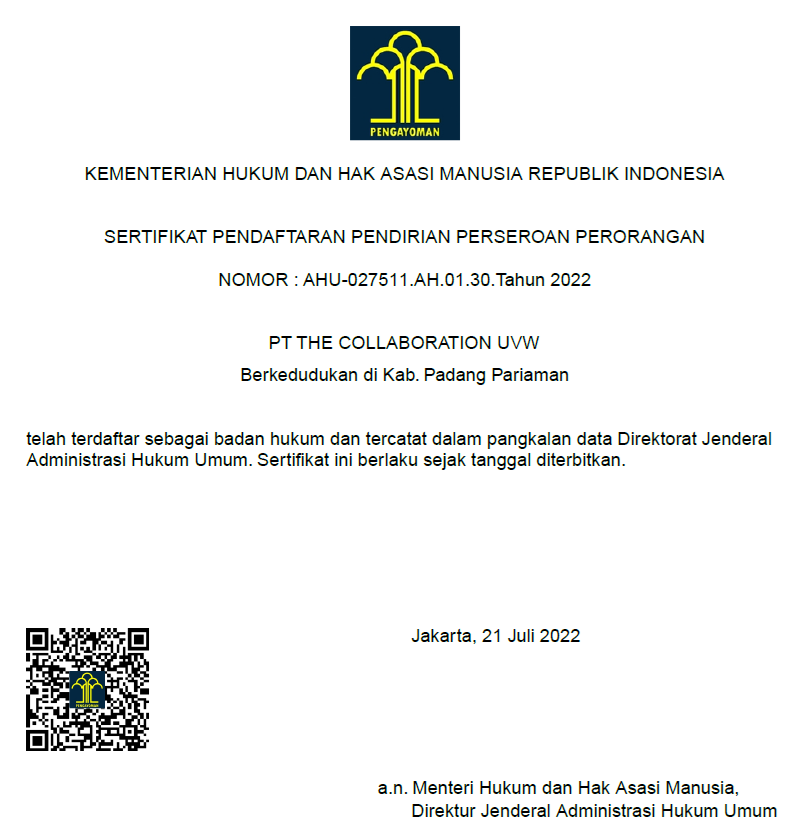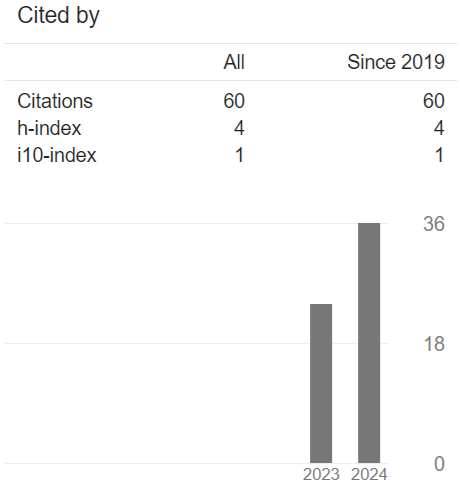Learning interest and discipline on the motorcycle business engineering student learning outcomes
DOI:
https://doi.org/10.62590/regy.v3i1.122Keywords:
learning interest, learning discipline, learning outcomesAbstract
This research aimed to analyze the relationship between learning interest and discipline on the learning outcomes of 11th-grade Motorcycle Business Engineering students at SMK Negeri 1 Sintuk Toboh Gadang. A quantitative correlational research method was used with all 11th-grade Motorcycle Business Engineering students as subjects. Data collection techniques used questionnaires to measure learning interest and discipline, and documentation for learning outcome data. Data analysis used the product-moment correlation test. Results showed no significant relationship between learning interest or learning discipline and learning outcomes. However, a strong positive correlation was found between learning interest and discipline. Most students demonstrated moderate to good learning interest and discipline levels, with satisfactory learning outcomes. In conclusion, although students’ learning interests and discipline were fairly good, this was not reflected in their learning outcomes, indicating the need for further research on other factors influencing vocational high school students’ learning outcomes.
References
Abulela, M. A. A., & Bart, W. M. (2020). Learning and study strategies and engagement among Egyptian undergraduates: Do gender and discipline matter? Educational Psychology, 41(9), 1160-1179. https://doi.org/10.1080/01443410.2020.1834076.
Al-Thani, H., Chaaban, Y., & Du, X. (2023). Factors influencing discipline-specific facilitators’ roles in a multi-tiered professional learning programme in higher education. Research in Post-Compulsory Education, 28(3), 530-549. https://doi.org/10.1080/13596748.2023.2221123.
Asih, E. D. (2020). Pengaruh minat belajar dan disiplin belajar terhadap hasil belajar PAI siswa kelas X di SMKN 1 Dumai tahun ajaran 2020/2021. Tadzakkur Jurnal Pendidikan Islam, 2(2), 23-37. https://doi.org/10.57113/taz.v2i1.121.
Chang, R. C. (2024). Using virtual reality to enhance forensic science education: Effects on CSI learning achievements, situational interest and cognitive load. Journal of Criminal Justice Education, 1-20. https://doi.org/10.1080/10511253.2024.2372860.
Dukalang, M. (2024). Minat belajar dan disiplin belajar terhadap hasil belajar Siswa. Jurnal Pendidikan Ekonomi dan Bisnis, 1(1), 41-50.
Gardner, M. J., Wu, R., & Todd, P. R. (2023). What the Font! The role of handwritten font in course interest, student inference, and learning outcome. Marketing Education Review, 34(1), 77-95. https://doi.org/10.1080/10528008.2023.2290730.
Hidayatulloh, A. N., & Dwihartanti, M. (2018). Pengaruh minat belajar dan disiplin belajar terhadap prestasi belajar mata pelajaran kearsipan siswa administrasi perkantoran. Jurnal Pendidikan Administrasi Perkantoran, 7(1), 1-10.
Ko, D., Bal, A., Bird Bear, A., Sannino, A., & Engeström, Y. (2021). Transformative agency for justice: Addressing racial disparity of school discipline with the Indigenous Learning Lab. Race Ethnicity and Education, 25(7), 997-1020. https://doi.org/10.1080/13613324.2021.1969903.
König, L. (2020). Podcasts in higher education: Teacher enthusiasm increases students’ excitement, interest, enjoyment, and learning motivation. Educational Studies, 47(5), 627-630. https://doi.org/10.1080/03055698.2019.1706040.
Kwarikunda, D., Schiefele, U., Ssenyonga, J., & Muwonge, C. M. (2020). The relationship between motivation for, and interest in, learning physics among lower secondary school students in Uganda. African Journal of Research in Mathematics, Science and Technology Education, 24(3), 435-446. https://doi.org/10.1080/18117295.2020.1841961.
Lavonen, J., Ávalos, B., Upadyaya, K., Araneda, S., Juuti, K., Cumsille, P., Salmela-Aro, K. (2021). Upper secondary students’ situational interest in physics learning in Finland and Chile. International Journal of Science Education, 43(16), 2577-2596. https://doi.org/10.1080/09500693.2021.1978011.
Lee, K. H., Jun, J. S., Kalb, A., & Bolin, B. (2024). Computer anxiety, technology acceptance, and online learning interests among social work students. Journal of Human Behavior in the Social Environment, 1-11. https://doi.org/10.1080/10911359.2024.2421398.
Oknaryana, O., & Irfani, O. (2022). Pengaruh minat belajar dan kedisiplinan siswa terhadap hasil belajar siswa. Jurnal Ecogen, 5(2), 258-267. http://dx.doi.org/10.24036/jmpe.v5i2.13152.
Pemerintah Republik Indonesia. (2003). Undang-undang Republik Indonesia Nomor 20 Tahun 2003 tentang Sistem Pendidikan Nasional. Kementerian Riset, Teknologi, dan Pendidikan Tinggi.
Pimentel-Mannan, I. A., Nese, J. F. T., Newson, A., Kjellstrand, J., & Nese, R. N. T. (2023). Addressing discipline equity: The inclusive skill-building learning approach (ISLA) an alternative to exclusionary discipline. Preventing School Failure: Alternative Education for Children and Youth, 68(4), 318-329. https://doi.org/10.1080/1045988X.2023.2252761.
Rahayu, F. (2017). Pengaruh kemandirian belajar, minat belajar, disiplin belajar dan lingkungan belajar terhadap hasil belajar siswa. Socia: Jurnal Ilmu-ilmu Sosial, 15(2), 8-17. https://doi.org/10.21831/socia.v15i2.22680.
Rifdarmon, R., Sa’diah, H., & Syaifullah, L. (2023). Perancangan bodi kendaraan prototype arrow concept sebagai media pembelajaran mata kuliah Konstruksi Badan Kendaraan. Edukasi: Jurnal Pendidikan, 21(1), 172-186. https://doi.org/10.31571/edukasi.v21i1.5679.
Romdhane, M. B., & Khacharem, A. (2021). Controlling the display of videos in a physical education context: Effects on learning outcomes and situational interest. Physical Education and Sport Pedagogy, 28(5), 517-529. https://doi.org/10.1080/17408989.2021.2005013.
Sanjaya, W. (2015). Strategi pembelajaran berorientasi standar proses pendidikan. Jakarta: Kencana Prenada Media Group.
Syaifullah, L., Ambiyar, A., Zaus, M. A., & Arpan, M. (2024). Efektivitas pendekatan blended learning berbantuan e-learning terhadap hasil belajar mahasiswa. Juwara Jurnal Wawasan dan Aksara, 4(1), 1-12. https://doi.org/10.58740/juwara.v4i1.73.
Tan, A. L., Gillies, R., & Jamaludin, A. (2024). The SOLIO taxonomy: An integrated model for assessing student learning and interest. Cambridge Journal of Education, 54(6), 761-778. https://doi.org/10.1080/0305764X.2024.2409180.
Zhang, M., & Pladevall-Ballester, E. (2021). Discipline-specific language learning outcomes in EMI programs in the People’s Republic of China. Language and Education, 35(4), 357-374. https://doi.org/10.1080/09500782.2021.1895827.
Downloads
Published
How to Cite
Issue
Section
License
Copyright (c) 2024 Febrian Alfischo

This work is licensed under a Creative Commons Attribution-ShareAlike 4.0 International License.
















